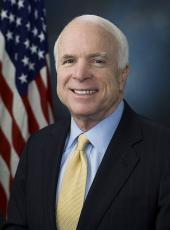IN CASE YOU MISSED IT: "Obama vs. His Advisers"
"'The fact that the tax subsidy, which supports the employer-sponsored system, is better than nothing is a feeble excuse for resisting any changes to the status quo.' That's not John McCain's judgment. It's a quote from Jason Furman, who happens to be Mr. Obama's economic policy director. In a cri de coeur published in the journal Democracy in 2006, Mr. Furman implored fellow Democrats and other progressives to confront 'a critical missing link' in their health ideology -- the same link his boss now spends most of his time demagoguing." -- The Wall Street Journal
"Obama vs. His Advisers"
Editorial
The Wall Street Journal
October 25, 2008
One underreported story of this election is how heavily John McCain has been damaged by Barack Obama's television ad assault on his health-care plan. A lot of voters seem to believe the Democrat when he says that Mr. McCain wants to deny them coverage or bankrupt them with crushing hospital bills.
Mr. McCain has himself to blame for not defending his own reform ideas, during the debates and in TV ads, against attacks that have been misleading when not flat-out false. Even so, Mr. Obama's tactics are especially cynical because his own health-care advisers support plans much like Mr. McCain's. Or at least they did before joining up with Mr. Obama.
Put simply, the McCain plan seeks to remedy a distortion in the health-care market that economists have spent decades begging politicians to fix: The tax code subsidizes insurance only if it is provided through employers. Individuals can't take the same tax deduction for buying insurance that businesses can. So Mr. McCain wants to "spread the wealth" of these tax breaks to individuals of any income through a refundable tax credit, no matter where they get coverage.
"The fact that the tax subsidy, which supports the employer-sponsored system, is better than nothing is a feeble excuse for resisting any changes to the status quo." That's not John McCain's judgment. It's a quote from Jason Furman, who happens to be Mr. Obama's economic policy director. In a cri de coeur published in the journal Democracy in 2006, Mr. Furman implored fellow Democrats and other progressives to confront "a critical missing link" in their health ideology -- the same link his boss now spends most of his time demagoguing.
Mr. Furman used to portray the current system as regressive, inequitable and a subsidy for health plans that insulate consumers from the cost of their care, thus inflating health spending. When he was director of the Brooking Institution's Hamilton Project, Mr. Furman outlined a health reform -- again using tax credits -- that took the "sensible approach" of "exposing individuals to the price of health care through greater cost sharing."
When President Bush unveiled a health reform similar to Mr. McCain's in 2007, Mr. Furman co-authored a Tax Policy Center paper that called it "innovative and a step in the right direction." As recently as May, he published a long article in Health Affairs on the possibilities of health-care tax reform.
What a difference an election makes. "The choice you'll have," Mr. Obama warned of the McCain plan during one of the debates, "is having your employer no longer provide you health care." Sounds terrible. But wait, let's consult another one of Mr. Obama's advisers. David Cutler, the Otto Eckstein Professor of Applied Economics at Harvard, put it this way: "Health insurance is not something that is made better by tying it to employment. As a result, essentially all economists believe that universal coverage should be done outside of employment."
That passage comes from Mr. Cutler's 2004 book, "Your Money or Your Life," which outlined a strategy for universal health care. Not surprisingly, Professor Cutler's plan, like Mr. McCain's, also applied subsidies such as "tax credits -- people get a lower tax bill, or a refund from the government, to be used to purchase insurance." In this he was echoing many other liberal health experts such as MIT's Jonathan Gruber, another Democratic policy star.
These advisers know that Mr. Obama's claim that Mr. McCain will tax health benefits "for the first time in history" is particularly disingenuous. For people who stick with employer coverage under the McCain plan, the money employers take out of wages to pay for insurance would be taxed, but the new credit more than covers the bill. The people who decide to buy coverage on their own would see their wages rise. And everyone who joins the individual market -- many of them uninsured now -- would be equipped with new health dollars, instead of paying with after-tax income.
Obviously neither Mr. Furman nor Mr. Cutler would endorse the McCain plan outright. They are, after all, Democrats. Liberals who support rearranging the tax code for health care think it must be accompanied by other insurance reforms to protect families in the individual market that Mr. McCain doesn't include. Even so, speaking on a Tax Policy Center panel on taxes and health insurance in February of this year, Mr. Furman said that "I think we should be cheerleading" the emphasis on tax reform, "not writing it off."
He even prefaced his remarks by joking, "this talk might actually sound like a John McCain rally." Maybe Mr. Obama should be running attack ads against his own economic guru.
Read The Editorial
John McCain, McCain Campaign Press Release - "In Case You Missed It": "Obama vs. His Advisers" Online by Gerhard Peters and John T. Woolley, The American Presidency Project https://www.presidency.ucsb.edu/node/291658

